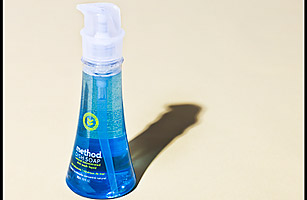
Adam Lowry and Eric Ryan, high school pals from suburban Detroit, are not exactly the kind of folks you would expect to launch a cleaning products business. They are, for lack of a better word, slobs. When they started Method Home, they lived in what they called one of the dirtiest apartments in San Francisco. And the total lack of interest in tidiness was nothing new: Ryan's mother says she's never seen him make his bed.
And yet, this unlikely duo — Lowry, a Stanford-trained climatologist who worked on the Kyoto Protocol, and Ryan a strategic planner who did branding for The Gap and Saturn — has come up with a unique formula that changed the way consumers think about the products they use to wash their hands, floors and clothes. In the process, they have changed the entire $5.2 billion cleaning products industry. By adding innovation (odor-neutralizing kitchen soap), cool packaging (laundry detergent in a pump), and fun fragrances (ginger yuzu!), to the traditionally staid green cleaning products category, they brought eco-friendly cleaning out of the natural foods stores and onto mainstream shelves.
"That was their brilliance — understanding not to limit the audience to people interested in the environment," says Candace Corlett, President of WSL Strategic Retail, a marketing consulting firm in New York. "They have pretty bottles so even if you are not inclined to be eco-friendly you want that bottle on your shelf."
At a time when more cash-strapped consumers are comparison shopping, clipping coupons, and moving to private label, Method has seen growth in sales in the last year in its premium-priced laundry and cleaning products. Its 100 products — from pink grapefruit phosphate-free dish soap to green tea and aloe foaming hand wash — are sold nationally in Target, CVS, Lowe's, and Bed Bath & Beyond. The products are also available in Canada, France, Japan and the UK; with the help of those markets, the San Francisco-based private company expects to generate more than $100 million in revenue this year.
A commitment to trying new things in new ways is what keeps Method ahead. Perhaps the best example, and Method's biggest investment — it spent $10 million on laundry ads last year alone — is laundry detergent. Calling the laundry jug the "SUV of consumer products, heavy but supremely profitable," Lowry claims Method was the first to launch a "triple concentrate" product, taking the water out and reducing the packaging material. Method eventually evolved its formula to 8X concentrate and put it in a lighthouse-shaped bottle with a pump that eradicates the need for pouring detergent into the cap. "It's one of the most functional packaging styles in the category," says Whole Foods Market's Senior Global Grocery Coordinator, Errol Schweizer. "They are the Herman Miller chair of cleaning products."
It's been a decade since Lowry, 36 and Ryan, 38 figured out a new way to clean up in the cleaning products aisle. In 2000, when their friends were investing their efforts in dot-com companies, the pair spied an opportunity in the "sea of sameness" and total lack of fun in the category. At the same time, they zeroed in on the cultural shifts toward aspirational home living and health and wellness. "People were eating more healthfully, and organic, but cleaning products were filled with pesticides and poisons," says Ryan. Method's idea: Aveda for the home — an "eco-chic" approach to home care.
The housemates tapped Lowry's chemistry background and started making spray cleaning products in their sink (and, from time to time, in a beer pitcher) and gave out samples at parties. They went to independent stores and befriended the managers who made buying decisions. They did demos in the stores and gained consumer insight. "We were surprised how quickly it resonated," says Ryan. Consumers liked the bright candy-like colors and the unusual cucumber, lavender, and mandarin orange scents. After first getting into Bay Area stores, Method soon found its products in 1,000 regional grocery stores.